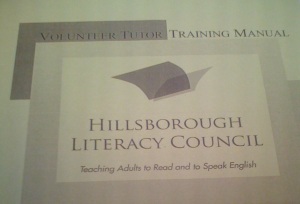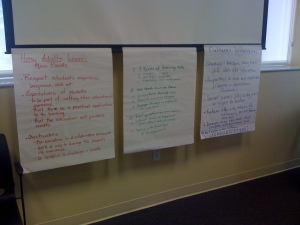
It’s official.
After a Saturday workshop with the Hillsborough Literacy Council in partnership with ProLiteracy, I am now an adult literacy tutor.
8 is Not Enough
Eight of us attended the training. Paltry numbers given the frequency of the workshops (this is the last one for the year) and the need. According to the Adult Literacy Coordinator, there are 57 learners waiting for a basic literacy tutor. Because the sessions are one-to-one, 57 tutors are required (or at least there are 57 slots). Meanwhile, there 352 learners in need of an English tutor. These students meet in small groups of 2-6 students at a time. That adds up to a deficit of well over 100 tutors. Our group of eight will help some, but so many more are needed.
About the Learners
In fact, 3 out of 20 adults in Hillsborough County read below a fourth grade level. That’s 15%. Many of them developed coping strategies that have served them, in some cases, for decades. One of the tutors asked if all the learners were older, as he presumed. No. For example, one young man is in his 20s, and simply never learned to read because he dropped out of school to work. Learner biographies vary, and older learners also seek help. One older gentleman is now requesting help as his company recently went bankrupt and he is on the job market. His colleagues were aware of his inability to read, but he won’t be competitive for many jobs available now.
Learners, who request services through their local library, are matched with a tutor based on location and mutual availability. All learners are asked to invest $5 in their reading materials, although no one is turned away for inability to pay. The tutors had to pay a registration fee which includes our training materials, and also helps to defray the costs for learners unable to pay the fee.
Becoming a Tutor
After introductions and statistics, we summarized and synthesized short pieces on learner characteristics (i.e., learning style, culture, etc). We then discussed the implications for us as tutors.

After lunch, we split up into separate rooms – most of us learning more about the basic literacy tutoring, and the remainder choosing to explore English to Speakers of Other Languages (ESOL).
There was a super quick review of the five components of reading as outlined in the National Reading Panel: phonemic awareness, phonics, fluency, vocabulary development, and comprehension.
A sixth component not discussed, is the role of motivation. Obviously our learners will be motivated to learn. After all, they seek out the assistance and are free to stop at any time.

The Laubach Way
We watched a couple of short videos (including one teaching us to read Russian!), then had a practice run at an introductory lesson with the Laubach Way materials. Being a critical pedagogue, I have mixed feelings about the series.
It’s tightly structured and scripted, not unlike Direct Instruction in K-12. Beginning at lesson one, you learn specified letters in a specific order, with cues and hand motions delineated. Since most of the tutors have no background as reading teachers, it leaves little room for error. Unfortunately, it also leaves little room for the learner to co-construct a lesson and/or bring her background knowledge to bear.
But, as we discussed later, in addition to the “structured” time of the lesson, there are plenty of opportunities to engage in creative activities. I chose to think of it all as a reading class with time allotted for phonics, guided reading, and reader response.
Familiar Tools
The leader showed us many materials she uses with her students. They were all things I used when teaching my fourth graders how to read including: anecdotal records, reading logs, and a variety of texts (topics, length, genre). When I begin tutoring I will also add running records as I think they will provide a lot of good information. And, as we live in the digital age, it will be important to include multimodal, multimedia texts as well.
New Steps
At the end of the session the coordinator asked if I would be open to facilitating workshops in the new year. Definitely! My goal is to move toward more community-based teaching (specifically around literacy) and personal learning communities (in literacy and other areas). I’m happy to increase my literacy bona fides in ways that can ultimately support communities and individuals. I’m very excited to start this new chapter in my life. I plan to document, study and share my experiences in the upcoming year.
